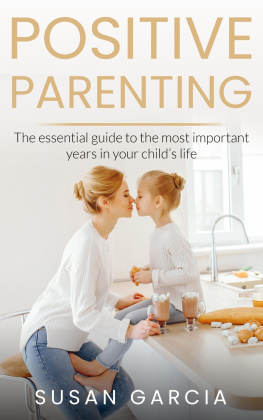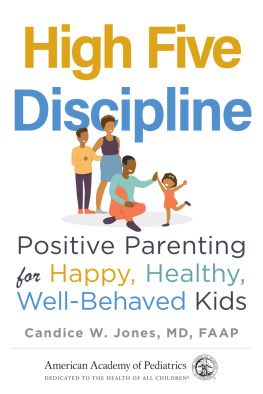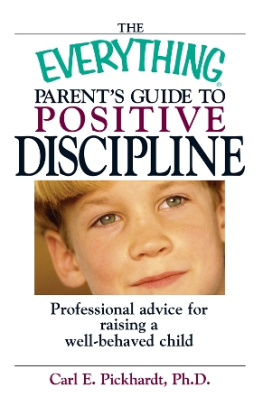Also by Susan Garcia
POSITIVE PARENTING
POSITIVE PARENTING: The Essential Guide To The Most Important Years of Your Child's Life
Positive Parenting: An Essential Guide to Understanding and Managing your Teen's Behavior
Standalone
Kid Confidence : A Parent's Guide : How to Build Resilience and Develop Self-Esteem in Your Child

Positive Parenting
The Essential Guide to The Most Important Years of Your Childs Life

written by
Susan Garcia
written by
Susan Garcia
CONTENTS
Copyright 2019 - All rights reserved.
The content contained within this book may not be reproduced, duplicated or transmitted without direct written permission from the author or the publisher.
Under no circumstances will any blame or legal responsibility be held against the publisher, or author, for any damages, reparation, or monetary loss due to the information contained within this book. Either directly or indirectly.
Legal Notice:
This book is copyright protected. This book is only for personal use. You cannot amend, distribute, sell, use, quote or paraphrase any part, or the content within this book, without the consent of the author or publisher.
Introduction
Parents have for a long time tried to figure out the relationship between them and their kids. While there are many techniques that one can use to strengthen this relationship, positive parenting is the number one way to raise happy, disciplined children. Parents are the most concern with their kids happiness, but they want to be happy as well .
We want to enjoy being parents and not have such a hard time correcting our kids behavior. For us, it would be bliss if our kids would not throw tantrums, talk back, did their homework on time, went to bed on time, and collected their toys leaving the house, and their rooms clean at all times. However, this is hardly ever the case, even with older children who know what they ought to do.
We scold, we talk, we repeat, and we give up. Sometimes we decide that sanity is better than all the yelling and policing we are subjected to . If a day would go by without me yelling, that would be like winning the lottery, we laugh with our friends over coffee.
However, maybe we have this all wrong. Maybe the yelling and talking and nagging are producing more problems than it is helping us raise healthy, disciplined and happy kids. Maybe we need to try another approach.
Imagine starting a kitchen garden to grow vegetables for your family. When you start with your seedlings, it will not look like much. You work your way out to watering, weeding and keeping insects, diseases, and birds away. After a few short weeks, your garden looks beautiful, and your family can enjoy it.
Similarly, raising children is like maintaining a garden. When your child first arrives, they are a blank canvass, like a seed, and how you take care of them by nurturing them through the difficult emotions of childhood determines how they will turn out as adults. Rearing children requires developing effective parenting skills, just like gardening.
Parents have agreed that there is no child-rearing manual, and while this is correct, research by psychologists and social scientists have revolutionized how children are raised by conducting experiments that help us understand children better. Research by Jean Piaget revealed that children do not understand situations in the same way adults do. Expecting children to act like mini-adults and behave will, therefore, get us nowhere.
Is all lost then? Are we stuck with kids who cannot listen and behave the way they should? Is parenting going to be an impossible uphill task? Lucky for us, the answer is no! Children are born ready to learn, and the first person they learn from is you and me. As a parent, modeling good and acceptable behavior is the first step in raising kids. We have heard people say that kids will do as you do, not as you say and it is true. Imagine then what we are modeling when we scold them guns blazing and send them to their rooms amid abuse and threats! Is this how we would like them to behave? So why do we model it?
If we are honest, we have used how we were raised as a foundation for raising our kids. If we were punished, we are prone to punish as well. If our parents were kind and respectful, we are likely to be kind and respectful. While we may carry hurt feelings in us from our childhood, healing these past pain helps us become better parents than our parents. Without healing, we are likely to inflict the same pain in our kids, create the same resentment we feel, and undoubtedly continue the cycle. However, we have to adopt a different method, so this cycle ends with us. By rewriting our past, we can write the future.
Once our past pain is healed, we must rewire our brains to positive parenting. A mental diet is not an easy diet. Like joining the gym, you are going against your bodys current and forcing it to start swimming uphill. Charles Duhigg has demonstrated this in his book The Power of Habit; Why We Do What We do in Life and Business. A parent prone to use punishment uses it with so much ease because it has already become a habit, formed slowly from how they were raised to how they have been using it on other kids, their peers, and now their kids.
To break the cycle, and ultimately use positive parenting techniques, we must make a conscious decision to break the habit. Easier said than done, but it is possible. When your child misbehaves, the routine is to use some form of punishment (yell, time-out, threaten, spank). What we want to achieve is connecting with our child, understanding where they are coming from and using the misbehavior as a platform to correct bad behavior and teach a life skill such as anger management, empathy, responsibility, timekeeping, among others.
Emotions are the center of living. Helping your child understand their emotions is helping them live a happy and successful life. We do what we do because of how it makes us feel. Let us strive to teach our kids, every day, how to handle their emotions, and they will learn how to handle their behavior. Before we discipline, we must consciously ask ourselves why did my child react like that? What can I teach? How can I best teach this lesson?
A child does not wake up and decide to be naughty. They have a reason behind every behavior, and they have desires they want to express, just like you and me. By knowing where they are coming from, we understand the desire they wish to be met, and use this as a teaching platform to show kids how to meet their desire without misbehaving.
The journey is only tough when you start. Positive parenting is not something you might be used to and snapping every once in a while, is ok. Like our kids, we are learning a new skill, and every skill takes time to master. The more you exercise a muscle, the stronger it becomes, and a mental muscle is no different. The more we continue to follow positive parenting principles, the more it is engraved in our minds that this is the new default setting.
Positive parenting is not about immediate gratification and instant pleasure, for our kids or us. Its about setting it upright for kids, and ourselves, to enjoy long-term happiness in life. Sometimes instant gratification is what we need, and it is achievable without using punishment. If you are in a public place and your child throws a tantrum, you want them to stop. This is a short-term goal for every discipline act. You also want to make sure that they do not repeat the behavior in question, which is a long-term goal for disciplining your child.







